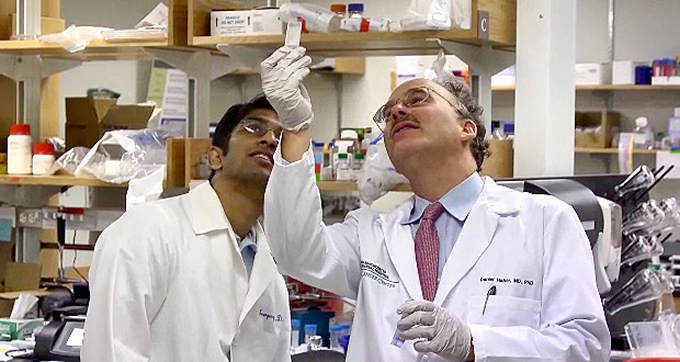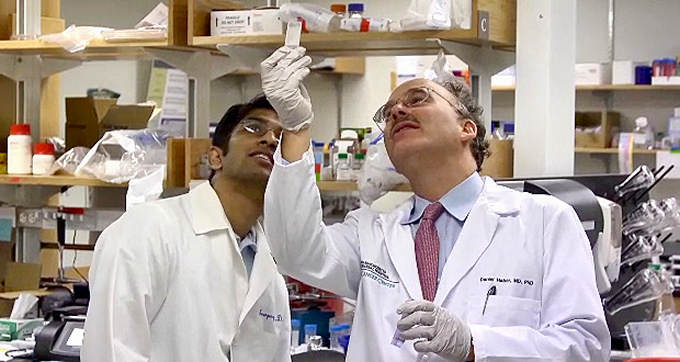
(Bethesda, MD, Sept. 06, 2016) – A prominent physician scientist supported by the National Foundation of Cancer Research (NFCR), Dr. Daniel Haber, and his team at the Massachusetts General Hospital Cancer Center have identified a dynamic gene expression in metastatic breast cancer that may contribute to disease progression and resistance to treatment experienced by many patients. Tumors can evolve in response to treatment and they may acquire new genetic features that may make them resistant to drugs and cause disease progression.
In their quest to find genetic changes in advanced breast cancer, the scientists utilized the rare circulating tumor cells (CTCs) found in a patient’s bloodstream — which have migrated away from a tumor and into blood vessels. CTCs offer a wealth of information to researchers and oncologists about the state of a patient’s cancer.
” I am thankful to the NFCR for their sustained support of our research to increase our understanding of the genes involved in the progression of cancer and to develop prevention and treatment strategies for metastatic cancer,” said Dr. Haber.
The Haber team used their device, the CTC-iChip, to collect viable CTCs from women initially diagnosed with primary breast tumors that are ER+/HER2-, meaning that their tumor cells expressed estrogen receptor genes (ER+) but did not express the HER2 gene (HER2-). Both ER and HER2 genes are known for their role in fueling breast cancer cells and promoting tumor growth. The patients had undergone multiple courses of treatment for recurrent metastatic cancer.
Intriguingly, molecular characterization of the isolated CTCs revealed not just ER+ / HER2- tumor cells, but also a second type: the ER+ / HER2+ cells that also express the HER2 gene.
Through a series of elegant laboratory experiments, the researchers delved deeper to characterize the CTCs and found a unique and dynamic interconversion of HER2 gene expression: ER+/HER2- cells could spontaneously become ER+/HER2+ and convert back to ER+/HER2-. In addition, researchers found that the two populations of tumor cells depended on different molecular signaling pathways for their proliferation and consequently, were sensitive to different anti-cancer drugs.
Because HER2 gene expression oscillates between on and off spontaneously in these tumors, researchers reasoned that the two separate signaling pathways may need to be simultaneously turned off to halt either cell group from repopulating one another and beginning new abnormal growth. Results of further experiments in cell cultures and more advanced tumor models proved that simultaneous treatment with chemotherapy paclitaxel and targeted therapeutic drugs that inhibit the NOTCH1 molecular signaling pathway achieved suppression of tumor cell growth expressing both ER+ / HER2- and HER2+ subpopulations.
This breakthrough discovery was published in the August 24 online edition of the journal Nature.
“Although more research is needed to uncover why HER2 has this dynamic on-and-off expression, these insights from our research are a positive development for a new treatment approach,” said Dr. Haber.
Dr. Haber also notes that clinical trials will now be needed to test whether these insights from experimental models will translate into better and more effective treatments for women with advanced breast cancer.
“The CTC research platform developed by Dr. Haber and his team continues to produce new knowledge about the intricate ways that cancer may grow and evade treatments,” said Franklin Salisbury, CEO of NFCR. “Metastatic disease causes more than 90% of the fatalities to cancer and the new insights from this research have opened the field for potential new treatment approaches so desperately needed for patients with metastatic breast cancer.”
###
About the National Foundation for Cancer Research
The National Foundation for Cancer Research (NFCR) is a leading cancer research charity dedicated to funding cancer research and public education relating to cancer prevention, earlier diagnosis, better treatments and, ultimately, a cure for cancer. NFCR promotes and facilitates collaboration among scientists to accelerate the pace of discovery from bench to bedside. NFCR is committed to Research for a Cure – cures for all types of cancer. For more information, visit http://www.nfcr.org/ or call (800) 321-CURE (2873).
Media Contact:
Hali Hartmann
713-380-2758
[email protected]
Media Contact
Dr. Hali Hartmann, Ph.D.
[email protected]
713-380-2758
Home
The post Scientists reveal insights into treatment resistance of metastastic breast cancer research appeared first on Scienmag.





